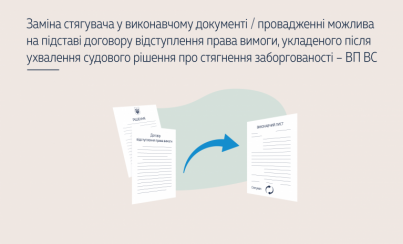Contact center of the Ukrainian Judiciary 044 207-35-46

An assignment agreement may be concluded by a creditor after a court decision on debt collection, which is the basis for replacing the creditor in the writ of execution / proceedings.
A court decision on debt collection under a contract does not change the nature of the obligation and does not create a new obligation, but only allows for its enforcement in enforcement proceedings.
When considering an application for replacement of the claimant, the court must verify the existence of the original creditor's right of claim and its validity, but cannot go beyond the procedural issue and establish the invalidity of the assignment agreement that has not been invalidated in accordance with the procedure established by law.
This was the conclusion of the Grand Chamber of the Supreme Court.
Under the circumstances of the case, the court ruled in favour of the plaintiff and recovered a penalty from the PJSC under the agreement on connection to the power grid. Enforcement proceedings to enforce this decision were not initiated.
Subsequently, the plaintiff and the applicant entered into an assignment agreement, under which the latter acquired the right to claim the monetary amounts recovered by the court decision. On the basis of this agreement, the applicant applied to the court to replace the claimant in the writ of execution.
The court of first instance, with which the court of appeal agreed, dismissed the application, noting that the law does not provide for the assignment of the claimant's right under a court decision by entering into a civil law contract.
In this case, the Grand Chamber of the Supreme Court concluded that the adoption of a court decision on debt collection under a contract is not a ground for replacing the obligation under the contract with a new obligation under a court decision, but only indicates the protective nature of such legal relations, which are protected by a court decision. Such a court decision does not change the scope of rights and obligations of the parties to the obligation, but only confirms their existence and enables the enforcement of a civil obligation in enforcement proceedings.
Since the enforcement of a court decision is the final stage of court proceedings, and the assignment of a claim is allowed at any stage of the court process, a creditor may enter into an assignment agreement after the court decision resolving the dispute between the parties to the substantive legal relationship (obligation), until the debtor fulfils the obligation or other circumstances arise that give rise to its termination.
Regardless of how the parties to the assignment agreement characterise (name) the existing obligation: as an obligation owed by the creditor on the basis of a transaction or as an obligation arising from a court decision resolving a dispute over the execution of the relevant transaction, this circumstance does not change the legal nature of the existing obligation. In view of the above, the conclusion of an assignment agreement after a court decision is made also results in the replacement of a party in a substantive legal relationship.
When considering an application for replacement of the creditor in the writ of execution (party to the enforcement proceedings, party to the case), the court may not violate the scope of the court proceedings and go beyond the procedural issue being resolved, to state (establish) the invalidity of the assignment agreement, which is not void under a mandatory provision of law or is not invalidated by the court as a result of the resolution of the relevant dispute.
The court must find out whether the original creditor generally had a claim against the debtor at the time of the assignment, check the validity of the claim at the time of filing the relevant application with the court, and investigate whether the law prohibits the assignment of claims in specific legal relations.
In this case, the courts did not investigate or establish the circumstances that would confirm the transfer of the claim from the original claimant to the applicant, although these circumstances are important for the correct resolution of the said application.
Therefore, the Grand Chamber of the Supreme Court concluded that since there is no procedural possibility to make a court decision on the merits of the application, the case should be sent for a new trial to the court of first instance.
Resolution of the Grand Chamber of the Supreme Court of 10 September 2025 in case No. 369/13444/20 - https://reyestr.court.gov.ua/Review/130456948 .
This and other legal positions of the Supreme Court can be found in the Database of Legal Positions of the Supreme Court - https://lpd.court.gov.ua/.